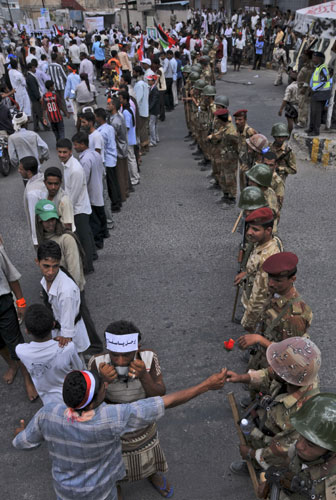Global General
Clerics and tribal leaders call for Saleh to step down
(China Daily)
Updated: 2011-04-16 09:28
 |
Large Medium Small |
|
 A protestor (bottom left) hands a flower to a soldier during a demonstration for the resignation of President Ali Abdullah Saleh, in Taiz, Yemen, on Thursday. [Photo/Agencies] |
SANAA, Yemen - Yemeni clerics and tribal leaders joined the opposition on Friday in calling for the immediate resignation of President Ali Abdullah Saleh, leaving the fate of a Gulf Arab mediation effort unclear.
| ||||
But opposition parties rejected the offer to join talks in Riyadh for a transfer of power in the Arabian Peninsula state and set a two-week deadline for President Ali Abdullah Saleh to step down.
"We have renewed our emphasis on the need for speeding the process of (Saleh) standing down to within two weeks. Therefore we will not go to Riyadh," said Mohammed al-Mutawakkil, a prominent opposition leader.
He was speaking after an opposition delegation met with Gulf ambassadors in Sanaa to seek clarifications on how soon Saleh could leave office.
In a statement, clerics and tribal chiefs said that Saleh must go immediately, and demanded "the dismissal of all his relatives from the military and security apparatus of the state".
Diplomatic sources say that talks, which began when protesters camped out in Sanaa in February demanding political reforms, have stalled over Saleh's desire for immunity from prosecution for himself and his family.
The Saudi-led initiative, which Saleh had sought for weeks, appeared to give him this, and he accepted the plan this week.
The statement from the clerics and tribal chiefs stated their "rejection of giving any assurances concerning the bloodletting". At least 116 people have died in protests, which security forces have attacked with live fire and tear gas.
Saudi and Western allies of Yemen fear that a prolonged standoff in Yemen, where Saleh has faced two months of protests demanding his overthrow, could ignite clashes between rival military units and cause chaos that would benefit an active al-Qaida wing operating in the poor, mountainous country.
Mutawakkil, however, said that the opposition could reach an agreement on granting assurances against prosecution, leaving the timing of a transfer as the major holdup.
"We didn't find in the clarifications that the ambassadors presented anything that meets our demands for an immediate removal," Mutawakkil said. "There was nothing new from the Gulf Cooperation Council ambassadors."
Saleh, who has already lost control of several provinces, has warned of civil war and the break-up of Yemen if he is forced to step aside before organizing parliamentary and presidential polls over the next year.
Pro- and anti-Saleh forces were expected to rally supporters after Friday prayers amid fears violence could escalate in the impoverished country, half of whose 23 million people own a gun.
"This is proof that the opposition doesn't want dialogue or peaceful solutions, but want to come to power through chaos," Tarek al-Shami, a spokesman for Yemen's ruling party, said on Thursday of the opposition decision to turn away from the talks.
The government also accused forces belonging to defected General Ali Mohsen, whose troops have been protecting the protesters in Sanaa, of abducting two government soldiers from an area near the city's main protest zone.
Mohsen, a kinsman of Saleh, has welcomed the Gulf mediation but did not object to the opposition refusal. A source in Mohsen's office denied seizing the soldiers.
The drawn-out standoff over a transition, however, has not appeared to affect the energy of street protesters who turned out for two straight days by the tens of thousands in the capital despite rain.
A transition of power in Yemen could technically last until the next presidential election scheduled for 2013, a prospect the opposition finds unacceptable.
Saleh has offered new parliamentary and presidential elections this year as part of political reforms, but says that he should stay in power to oversee the change or hand over to "safe hands".
Reuters
| 分享按钮 |



